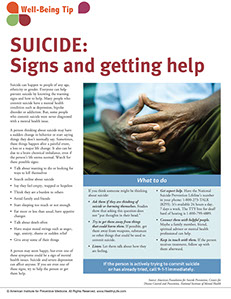SYMPTOM CHECKER
CONDITIONS
Male
Female
Child
Arm, Hand & Shoulder Concerns
Legs & Feet Concerns
Dental & Mouth Concerns
Ear & Nose
Eye Conditions
Head Conditions
Arm, Hand & Shoulder Concerns
Legs & Feet Concerns
Front
Back
Arm, Hand & Shoulder Concerns
Dental & Mouth Concerns
Ear & Nose
Eye Conditions
Head Conditions
Arm, Hand & Shoulder Concerns
Dental & Mouth Concerns
Ear & Nose
Eye Conditions
Head Conditions
Front
Back
Arm, Hand & Shoulder Concerns
Neck Links
Head & Neck Concerns
Arm, Hand & Shoulder Concerns
Neck Links
Head & Neck Concerns
Front
Back
Online Clinic
Wise Healthcare
Suicide: Signs and getting help
Print on Demand
Suicide can happen to people of any age, ethnicity or gender. Everyone can help prevent suicide by knowing the warning signs and how to help. Many people who commit suicide have a mental health condition such as depression, bipolar disorder or addiction. But, some people who commit suicide were never diagnosed with a mental health issue.
A person thinking about suicide may have a sudden change in behavior or start saying things they don’t normally say. Sometimes, these things happen after a painful event, a loss or a major life change. It also can be due to a brain chemical imbalance, even if the person’s life seems normal. Watch for these possible signs:
• Talk about wanting to die or looking for ways to kill themselves
• Search online about suicide
• Say they feel empty, trapped or hopeless
• Think they are a burden to others
• Avoid family and friends
• Start sleeping too much or not enough
• Eat more or less than usual, have appetite changes
• Talk about death often
• Have major mood swings such as anger, rage, anxiety, shame or sudden relief
• Give away some of their things
A person may seem happy, but even one of these symptoms could be a sign of mental health issues. Suicide and severe depression can affect anyone. If you see even one of these signs, try to help the person or get them help.
What to do
If you think someone might be thinking about suicide:
• Ask them if they are thinking of suicide or harming themselves. Studies show that asking this question does not “put thoughts in their head.”
• Try to get them away from things that could harm them. If possible, get them away from weapons, substances or other things that could be used to commit suicide.
• Listen. Let them talk about how they are feeling.
• Get expert help. Have the National Suicide Prevention Lifeline’s number in your phone: 1-800-273-TALK (8255). It’s available 24 hours a day, 7 days a week. The TTY line for deaf/hard of hearing is 1-800-799-4889.
• Connect them with helpful people. Maybe a family member, friend, spiritual advisor or mental health professional can help.
• Keep in touch with them. If the person receives treatment, follow up with them afterward.
If the person is actively trying to commit suicide or has already tried, call 9-1-1 immediately.
Source: American Foundation for Suicide Prevention, Centers for Disease Control and Prevention, National Institute of Mental Health
This website is not meant to substitute for expert medical advice or treatment. Follow your doctor’s or health care provider’s advice if it differs from what is given in this guide.
The American Institute for Preventive Medicine (AIPM) is not responsible for the availability or content of external sites, nor does AIPM endorse them. Also, it is the responsibility of the user to examine the copyright and licensing restrictions of external pages and to secure all necessary permission.
The content on this website is proprietary. You may not modify, copy, reproduce, republish, upload, post, transmit, or distribute, in any manner, the material on the website without the written permission of AIPM.
2021 © American Institute for Preventive Medicine - All Rights Reserved. Disclaimer | www.HealthyLife.com
















































